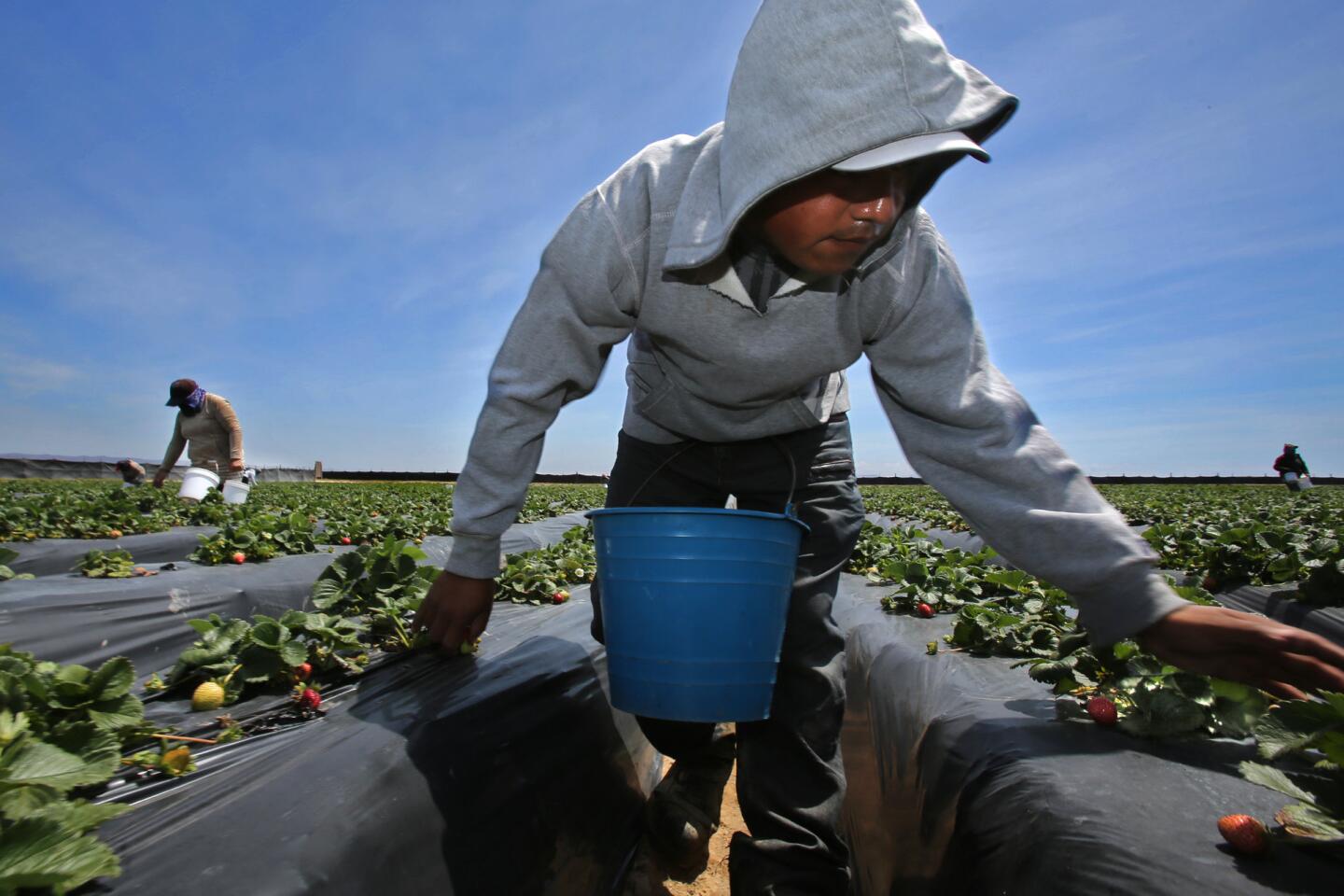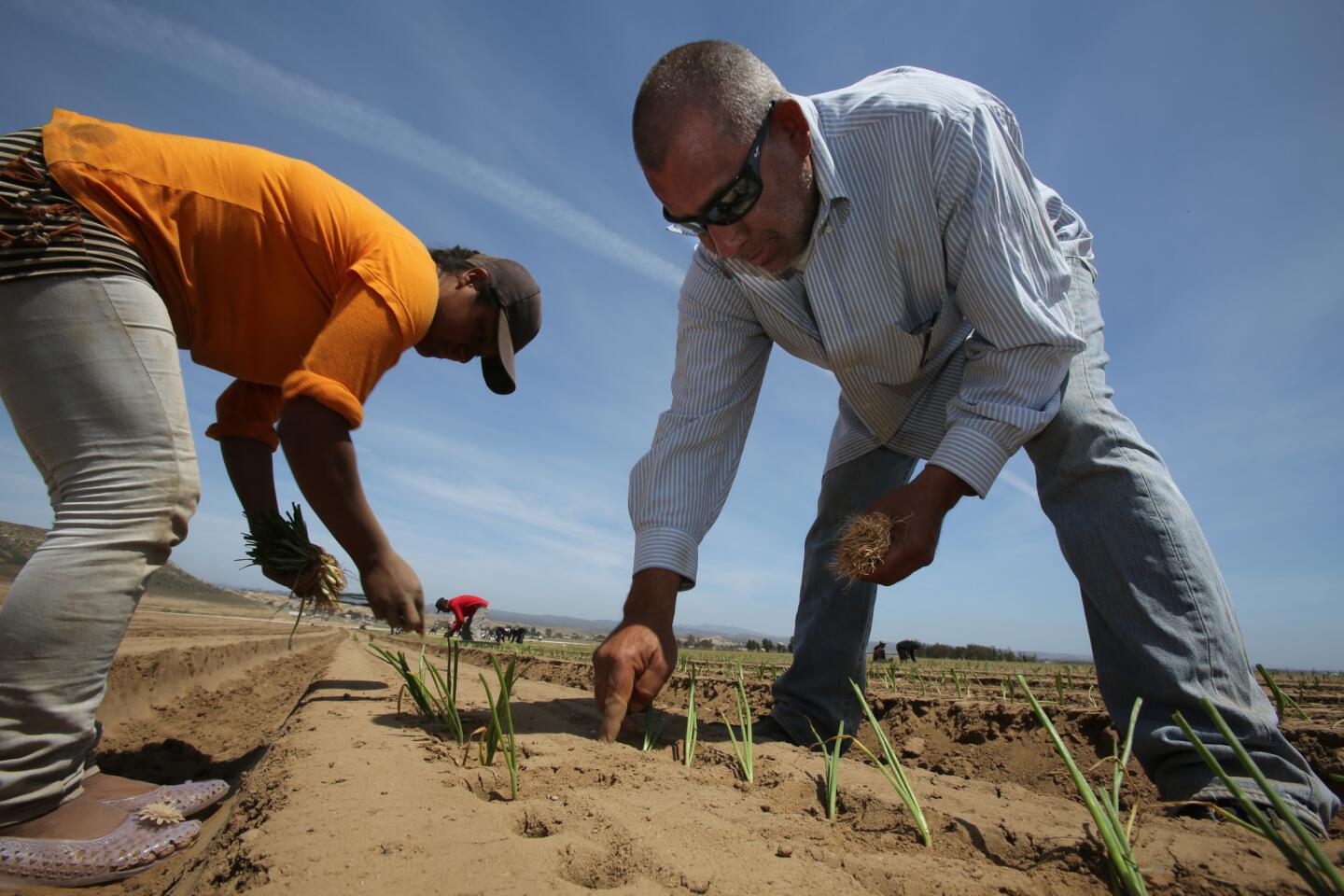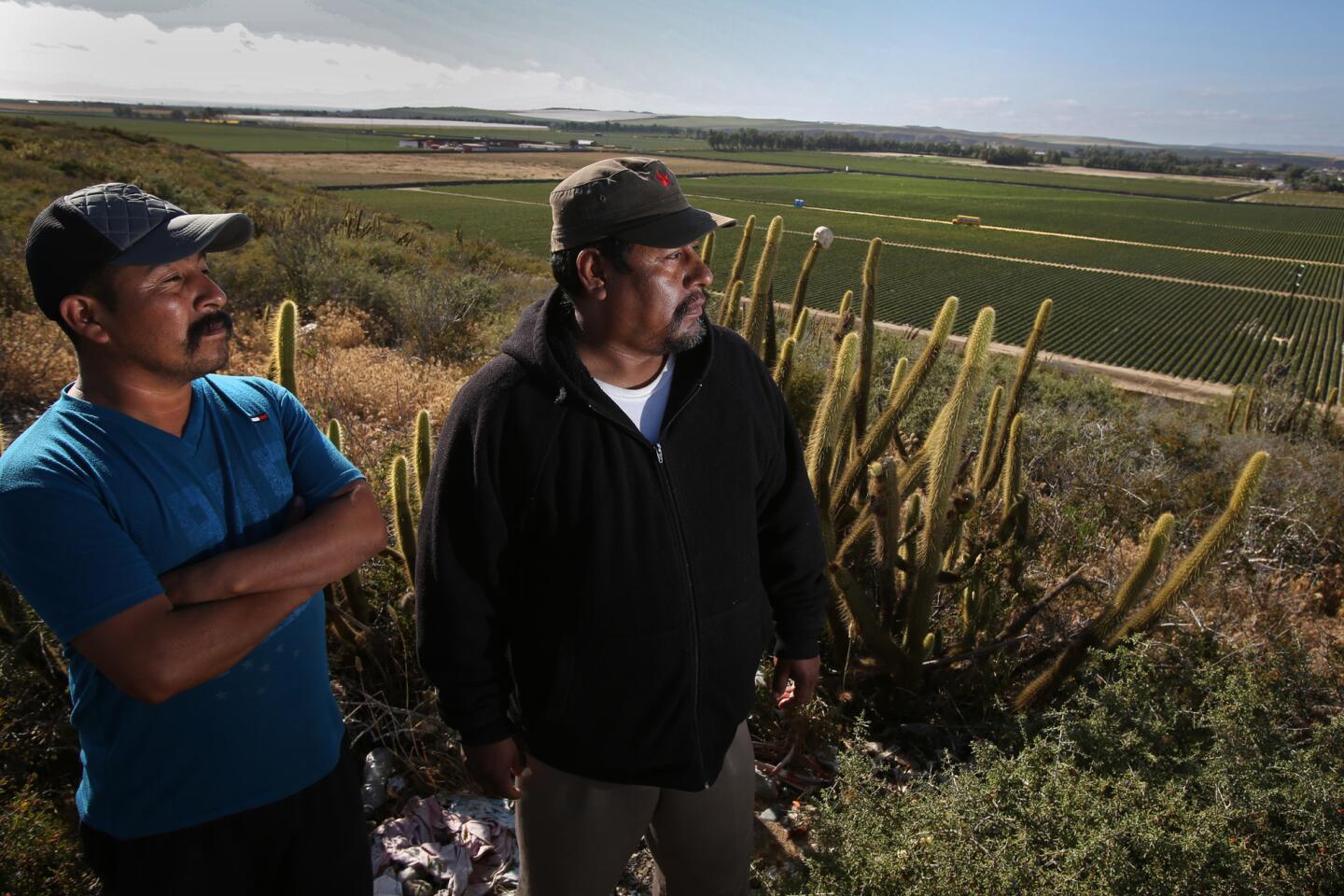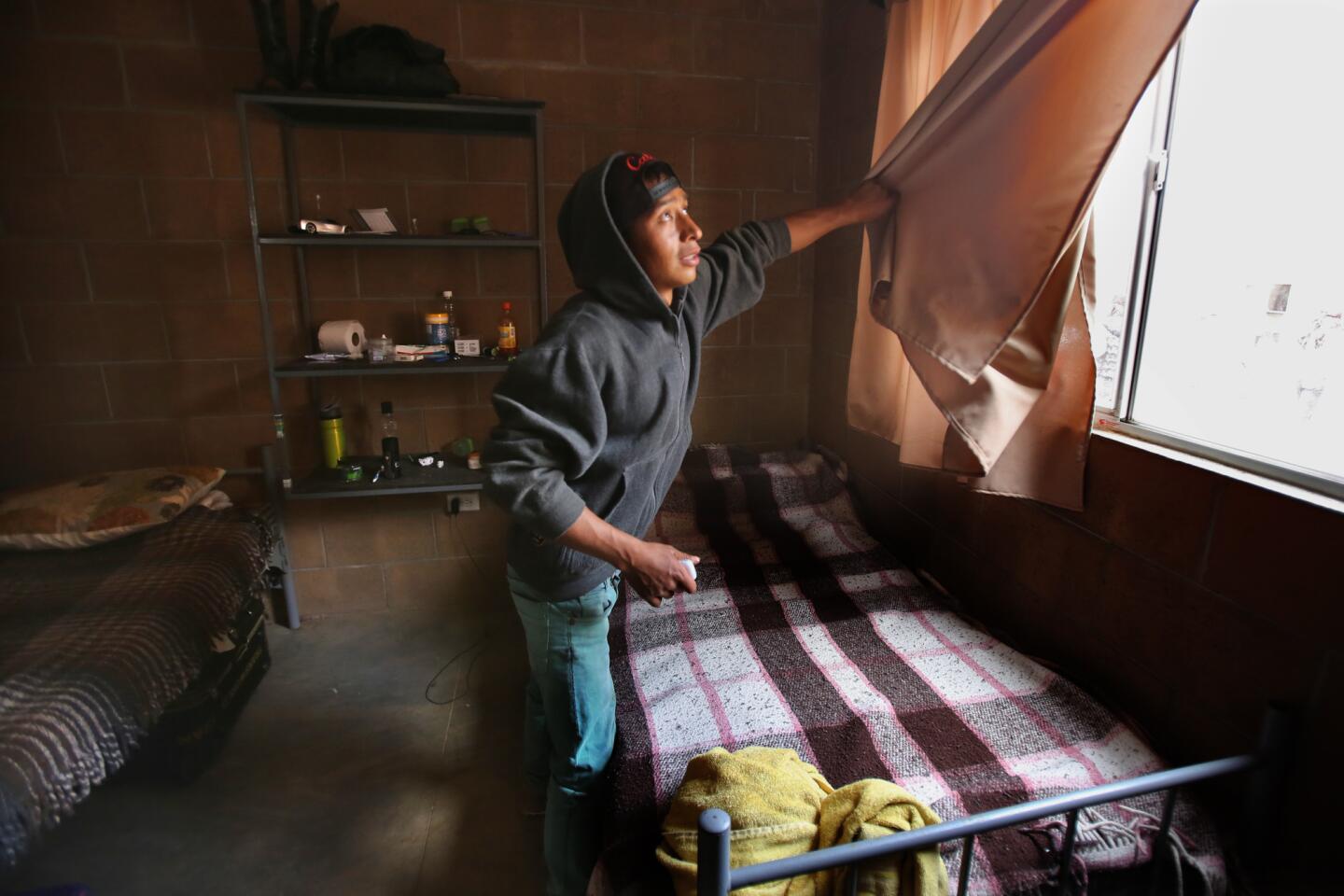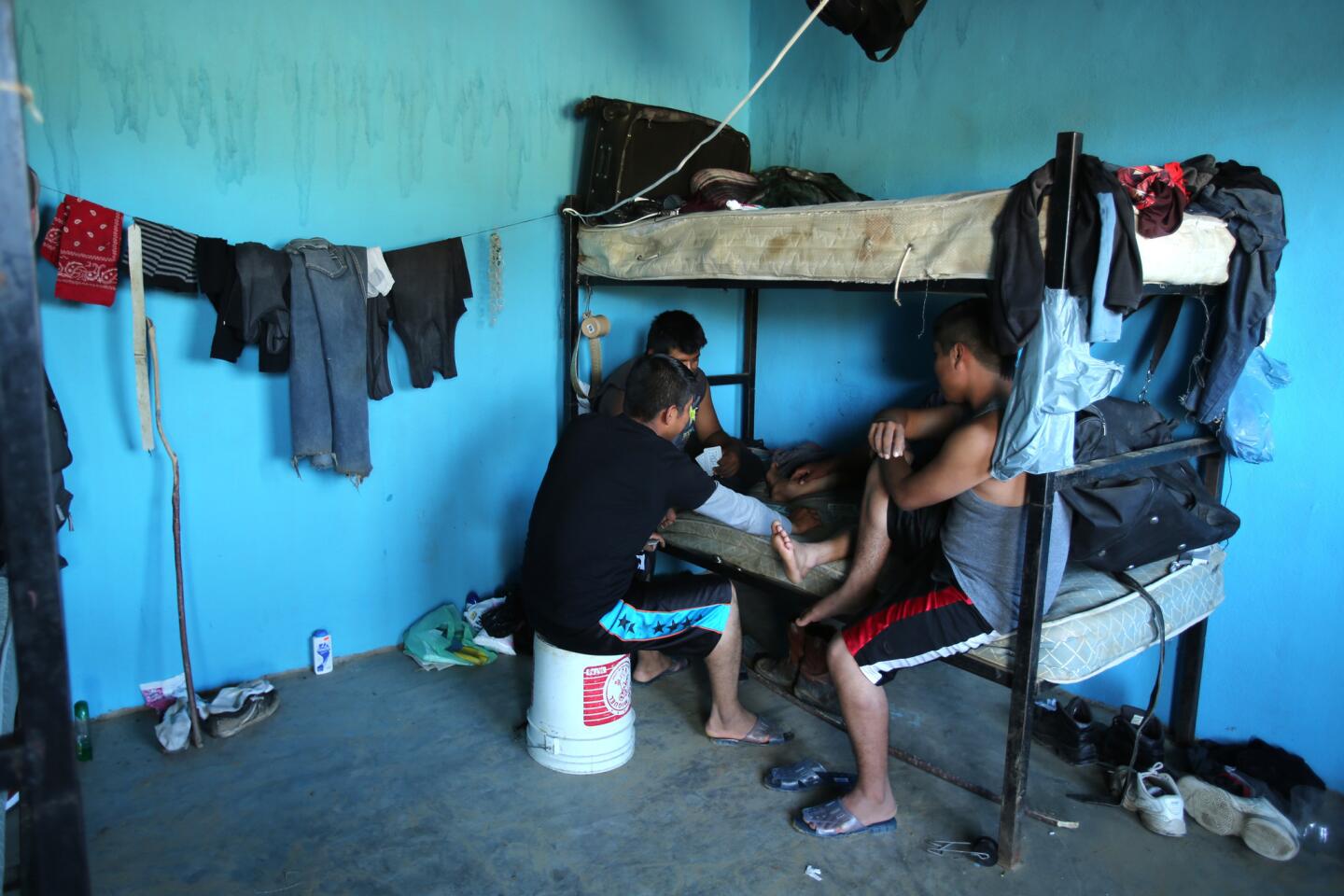A year after a violent and costly strike, Baja farm laborers see uneven gains
One year ago, a farm labor strike in this tranquil valley erupted in violence, with police and strawberry pickers clashing in a series of running battles that left government buildings torched, laborers bloodied and dozens of people arrested.
When the hail of rocks and rubber-bullets ceased, negotiations resumed and within a month labor leaders and growers had reached a historic agreement to raise wages and guarantee benefits for tens of thousands of farmworkers.
Today, this windswept region 200 miles south of San Diego is thriving again as a major exporter of berries and tomatoes to supermarket chains across the U.S., but laborers remain restive, expressing a mix of pride at their landmark achievement and frustration at the halting pace of change.
“We made progress, but there’s still so far to go,” said Rafaela Caballero, 27, looking up while picking strawberries on an early April morning.
See more of our top stories on Facebook >>
Considered the most significant set of achievements for a farm labor movement in recent Mexican history, the 12-week strike fixed a spotlight on some of the ugly realities behind Mexico’s produce export boom.
What started as a door-to-door campaign by poor indigenous people ended up disrupting produce markets across North America and forcing the Mexican government and powerful agribusinesses to the negotiating table.
But the accord has played out unevenly across the 50-mile San Quintin Valley, with conditions often varying from field to field, grower to grower.
BerryMex, the region’s biggest grower and a major supplier for the powerhouse U.S. brand Driscoll’s, boosted its minimum daily wage to 226 pesos, about $12 — among the highest pay for farmworkers anywhere in Mexico.
And many growers now pay social security and other benefits.
But others continue skirting the legally required benefits and resisting the increases called for in the government-backed accord. And government officials, who were supposed to enforce labor laws, have provided only spotty oversight, pickers, growers and labor leaders say.
Perhaps the strike’s biggest gain was the creation of two independent farm labor unions. They are among the first of their kind in Mexico, but membership ranks appear thin and their storefront offices are barren — a reminder of the challenges ahead.
The rundown building that houses the Independent National Democratic Union of Agricultural Workers features a lone table and a few buckets that double as chairs.
“It’s a union for farmworkers. We don’t have a lot of money,” said Bonifacio Martinez, one of the union leaders.
NEWSLETTER: Get the day’s top headlines from Times Editor Davan Maharaj >>
The strike — in its size, ferocity and 12-week duration — caught Mexico and the industry by surprise. Workers, angry over stagnant wages, blocked the main highway linking the region to California, leaving crops to rot and costing growers tens of millions of dollars in losses.
The agreement, which called for minimum daily wages of 150 to 180 pesos, or $8 to $10, was shaky from the start. Growers have long resisted boosting pay, saying salaries are higher than other parts of Mexico. But labor leaders counter that the region’s export-driven profits are higher and that salaries are eroded by the high costs of living in the border area.
Rancho Los Pinos, whose tomatoes, bell peppers and cucumbers, reach retail stores across the U.S., raised its wages to 150 pesos per day. The agreement, labor leaders say, calls for 180 pesos for large farms like Pinos.
Pinos executives said lower wages are justified because its workers are provided housing, day care and other benefits. The labor camp, housing about 1,200 people, appears better than many in Mexico, featuring grassy fields, uncrowded rooms and three day-care facilities.
But critics say many of the benefits at Los Pinos are subsidized by the government. They accuse the farm of importing workers from deeply impoverished regions — both to suppress wages and replace locals who refuse to work under the existing conditions.
Ceferino Jimenez, a worker at the Los Pinos camp, said daily earnings of 300 pesos during the high season drop significantly during the low season. It was unjust, he said, that other workers in the valley were making more for the same amount of work.
We only got a 20-peso raise. It’s not enough to make ends meet.
— Ceferino Jimenez, a worker at the Los Pinos camp
“We only got a 20-peso raise,” Jimenez said. “It’s not enough to make ends meet.”
Fortino Heredia, president of the Agricultural Council of Baja California, a trade group that represents most of the region’s growers, said farmers “to the extent possible” have increased wages more than 15%.
At Heredia’s farm, Dos Amigos, workers got a salary boost, but get paid in cash, with no payroll stub, and say they don’t receive government benefits such as social security and vacation days. Heredia said he provides benefits, but didn’t respond to accusations that workers don’t receive payroll information.
Heredia has received extra scrutiny because the organization he leads is part of a group formed by the federal government to improve the lives of Mexican farmworkers. The organization, the International Produce Alliance to Promote a Socially Responsible Industry, was created last year after The Times exposed abusive conditions at Mexico’s export farms.
“What’s the message he’s sending to the other growers?” said Erik Nicholson,vice president of the United Farm Workers, which has monitored the labor movement. “It suggests a continued culture of impunity for growers in the San Quintin Valley.”
The resistance from some growers contrasts with BerryMex, a Watsonsville, Calif.-based agribusiness that has been largely responsive to the labor movement’s demands.
BerryMex, which employs up to 4,500 workers, has raised its wages to the highest in the valley. Its labor camp, housing 500 seasonal workers, is among the most modern in Mexico. It has brought in an outside group, Fair Trade USA, to provide certifications of worker standards. Under the Fair Trade program, Costco and Whole Foods have agreed to pay a 50-cent premium per box to fund community projects, Fair Trade and BerryMex representatives say.
Despite the efforts, BerryMex remains a target of some labor leaders who have refused to lift their boycott of Driscoll’s, the world’s largest berry distributor. The leaders said they won’t do so until the company signs a collective bargaining agreement with a union. Driscoll’s executives say they are open to discussing the issue.
Executives for Driscoll’s and BerryMex say they are unfairly being targeted for economic harm because Driscoll’s is an easy target. Unlike other operators, Driscoll’s has a mostly transparent supply chain and is a widely known label.
It’s frustrating because we’re totally committed to doing the right thing and engaging some of these people.
— Soren Bjorn, a Driscollâs executive vice president, on the refusal of some labor leaders to lift their boycott against the firm
“We’re the one brand that people recognize … so unfortunately we are in their toolbox try to get demands met,” said Soren Bjorn, a Driscoll’s executive vice president. “It’s frustrating because we’re totally committed to doing the right thing and engaging some of these people.”
At a sprawling BerryMex field of organic raspberries, several pickers acknowledged that BerryMex provides relatively high wages for the region but said there was still a need for a strong labor movement to preserve recent gains and ensure wages keep up with inflation.
“If I go to a store with 1,000 pesos [about $55], it barely buys anything, especially if you have a family to support,” said Pablo Martinez, 25, a father of two who said he makes about 1,300 pesos weekly.
Union leader Fidel Sanchez, a former picker whom many growers blame for last year’s unrest, remains a controversial figure.
Brutal police tactics, he said, were to blame for last year’s violence, but he said growers have used the chaos as an excuse not to negotiate with his Independent National Democratic Union of Agricultural Workers.
Unlike other union leaders, Sanchez has insisted on continuing the Driscoll’s boycott. The labor movement still faces many hurdles, he said, but its accomplishments are already unprecedented.
“Before the labor action, BerryMex and Pinos never talked to us,” he said. “Now, they’re not responding to us out of their own volition. … Now they’re responding to us because we have a movement.”
ALSO
Produce industry giants team up to promote responsible labor practices
Mexican president proposes legalizing same-sex marriage
Twitter: @ricardin24
More to Read
Sign up for Essential California
The most important California stories and recommendations in your inbox every morning.
You may occasionally receive promotional content from the Los Angeles Times.
